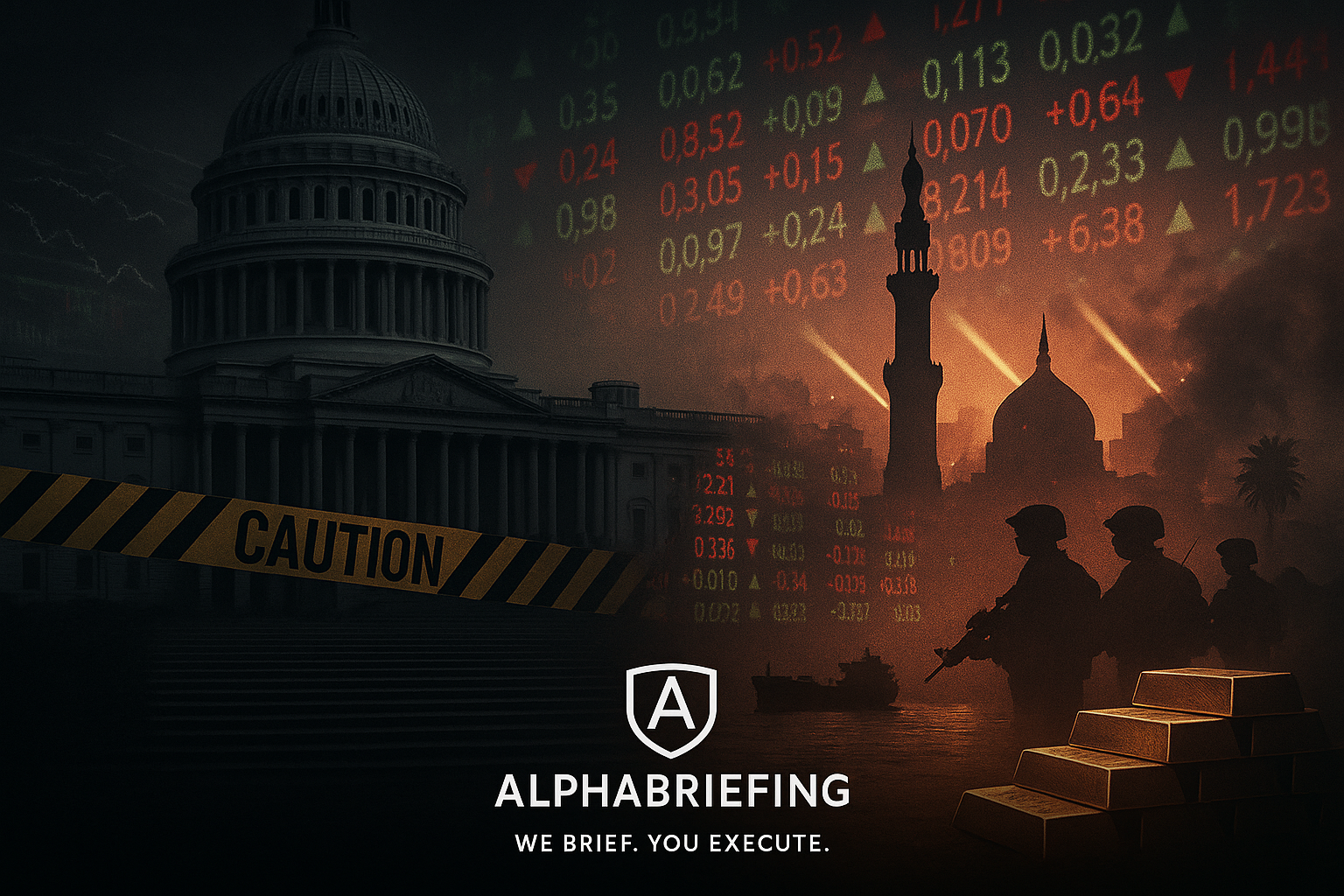🎲 Washington Gridlock, Middle East Gamble
Day 5 of the shutdown collides with fragile Gaza peace talks. Washington gridlock weakens U.S. credibility abroad as markets brace for binary outcomes: troop paychecks at risk at home, truce or escalation overseas. The stakes for investors have never been sharper.

Executive Summary
The U.S. enters its fifth day of a federal government shutdown even as the White House pushes a fragile Gaza peace plan onto the global stage. Both crises highlight the same paradox: America’s ability to project leadership abroad is being undercut by political paralysis at home. If the shutdown drags into mid-October and the Gaza plan stalls in Cairo, the costs will be counted in lost credibility, strained alliances, and shaken markets.
I. The U.S. Shutdown: A Political Siege
Status Report
- The government has been partially shut down since October 1 after Congress failed to pass a funding bill.
- The White House states Democrats forced the shutdown because they want free healthcare for illegal immigrants.
- Senate Republicans are backing what they describe as a nonpartisan, “clean” funding bill — one that simply reopens government without policy riders.
- Democrats, however, are holding out for healthcare concessions.
- House Speaker Mike Johnson has suspended all new votes until Oct. 14, betting that pressure will mount on Democrats first.
Impacts in Motion
- Roughly 750,000 federal workers are furloughed or working without pay.
- Essential services — defense, airports, border security — are still running, but strained.
- The shutdown is costing the U.S. economy an estimated $300–400 million per day, already in the $1.5–2 billion range in losses.
- The flashpoint date is Oct. 15, when active-duty U.S. troops could miss paychecks.
Strategic Implication
Republicans say they are defending taxpayers with a clean bill, while Democrats are portrayed as prioritizing entitlements. Either way, gridlock damages U.S. credibility at the exact moment Washington needs to project stability abroad.
II. Gaza: A Ceasefire or a Mirage?
The Proposal
- Ceasefire and release of all hostages.
- Israel pulls back troops in exchange for a large release of Palestinian prisoners.
- A new “Board of Peace” transitional authority would govern Gaza, backed by Egypt, Jordan, and possibly Western envoys.
- Netanyahu supports the framework but insists Hamas must be disarmed.
Reactions
- Hamas has signaled partial acceptance but refuses to disarm.
- Militias inside Gaza may resist centralized authority.
- Gaza itself remains devastated: almost no water, electricity, or hospitals.
Diplomatic Dynamics
- Talks in Cairo this week are a critical juncture — not guaranteed success or failure, but potentially decisive.
- The U.S. is fully invested — Trump has tied his personal brand to this plan.
- Regional powers like Qatar, Saudi Arabia, and Egypt will decide whether to fund and enforce it.
Risk Assessment
If the talks falter, violence will resume and U.S. credibility suffers. If they hold, the U.S. regains short-term diplomatic prestige — but also inherits the immense burden of rebuilding Gaza.
III. Two Fronts, One Strain
- Abroad: America urges compromise in Gaza.
- At home: America resists compromise in Congress.
Allies see the contradiction: Washington preaches stability overseas while dysfunction deepens at home. With Ukraine bogged down, China pressing Taiwan, and energy costs rising, partners want resolve — but see division.
🔒 The rest of this analysis — including our Market Watch, Outlook, and Stock Plays for the Week Ahead — is available only to AlphaBriefing Premium subscribers.
Upgrade today to access the full playbook, including:
- Section IV. Market Watch: How defense, oil, bonds, and airlines will react this week
- Section V. Outlook: The Oct. 15 tripwire and what it means for investors
- Section VI. Stock Plays: A plain-English breakdown of sectors and tickers to watch
👉 Join AlphaBriefing Premium to unlock the full briefing.
